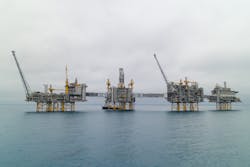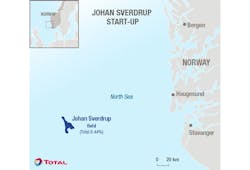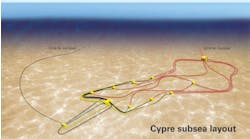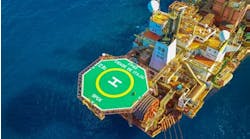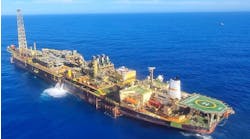Offshore staff
STAVANGER, Norway – Production started this weekend from the Johan Sverdrup Phase 1 field development in the central Norwegian North Sea.
According to operator Equinor, start-up was over two months ahead of the original schedule in the plan for development of operation, with a final cost of NOK83 billion ($9.09 billion), NOK40 billion ($4.38 billion) below the original estimate.
After reaching the first-phase plateau target next summer, operating costs should average less than $2/bbl. And once Phase 2 comes onstream in 2022, output will build to a peak of 660,000 b/d of oil.
At the same time, an electrical power link from shore will keep CO2 (carbon-dioxide) emissions below 1 kg/bbl, Equinor said.
According to Anders Opedal, executive vice president for technology, projects & drilling in Equinor: “The qualification of new installations technology has reduced safety risk, saved more than two million offshore hours and shaved months of the development schedule.
“We have also invested in digital solutions and ways of working to boost oil recovery, optimize production and improve field operations, and these new ways of working have already saved at least one month in the execution stage.”
This was Norway’s largest offshore greenfield development project since the 1980s, with recoverable reserves estimated at 2.7 Bboe.
“Johan Sverdrup is a giant development,” Opedal said, “built across nearly 30 construction sites in Norway and globally, and the field centre assembled in the North Sea counts as one of the largest on the Norwegian continental shelf.”
Equinor will manage operations from its offices in Stavanger, with base and helicopter services delivered from Dusavika and Sola in western Norway.
Produced oil is transported via a pipeline to the Mongstad terminal outside Bergen, with the gas exported to Kårstø.
Other partners are Lundin Norway, Petoro, Aker BP, and Total.
Phase 2 includes development of a second processing platform (P2), modifications to the Phase 1 riser platform and the field center, installation of five subsea templates, and a power-from-shore network to the Utsira High fields, which include Edvard Grieg, Ivar Aasen and Gina Krog, by 2022.
Wood Mackenzie research analyst Jamie Thompson said: “Since Lundin Petroleum struck oil at Johan Sverdrup nearly a decade ago, Norwegian exploration has fallen on hard times and the smaller average size of projects is increasingly evident.
“The next big fields due onstream are in the Norwegian sector of the Barents - an area where exploration has under-performed of late and there are larger questions marks over its viability.
“But to write off Norway would be to ignore the lessons of Johan Sverdrup’s discovery. Mature areas can still deliver world-class finds: you ignore them at your peril.”
10/07/2019
